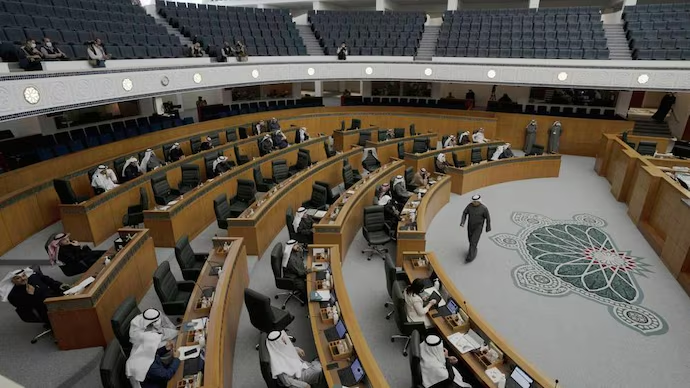In a major political shift, the Emir of Kuwait, Sheikh Meshal al-Ahmad al-Sabah, has accepted the resignation of Dr. Emad al-Atiqi, Oil Minister the Deputy Prime Minister and Minister of Oil. The resignation, confirmed on September 8, 2024, marks a significant moment in the nation’s ongoing political developments. This change has raised questions about the future direction of the country’s leadership and its implications for Kuwait’s oil sector, a cornerstone of the nation’s economy.
Dr. al-Atiqi, who had been a key figure in the Kuwaiti government, submitted his resignation after a period of mounting political pressure. Though the precise reasons behind his decision have not been fully revealed, the resignation is seen as a response to a combination of internal political challenges, ongoing issues within Kuwait’s oil sector, and perhaps broader regional economic factors. This resignation could also signal a shift in the nation’s political landscape, as the government grapples with the pressures of balancing its domestic affairs and regional responsibilities.
In an immediate response to the resignation, the Emir swiftly appointed Nora Suleiman Al-Fassam, the country’s Finance Minister and Minister of State for Economic Affairs and Investment, as the acting Oil Minister. This move is seen as strategic, aiming to ensure that the critical oil sector in Kuwait remains stable despite the leadership change. Al-Fassam’s appointment is significant as she brings extensive experience to the role, and her leadership will likely be scrutinized as she navigates the challenges within Kuwait’s oil industry.
Kuwait’s oil sector plays a pivotal role in the country’s economy, providing the bulk of its revenue. Given the centrality of oil exports to the nation’s wealth, stability in this sector is paramount for Kuwait’s economic future. The appointment of Al-Fassam as acting Oil Minister demonstrates the urgency with which the government is addressing this transition.
This change in leadership is likely to have far-reaching effects on both domestic and international levels. Kuwait, like many oil-dependent nations in the Middle East, faces numerous challenges, including fluctuating global oil prices, economic diversification efforts, and maintaining political stability. The resignation of a high-ranking official such as Dr. al-Atiqi could have broader implications for Kuwait’s foreign relations and its approach to energy policy. While Kuwait’s oil industry has long been a source of prosperity, there are increasing pressures for the country to invest in alternative sectors to reduce its dependency on oil in the long term. How the acting oil minister and the Kuwaiti leadership address these issues will be watched closely by both local and international observers.

Political analysts believe that Dr. al-Atiqi’s resignation could also be connected to the broader shifts in Kuwait’s political structure. In recent years, Kuwait has seen growing public dissatisfaction with the pace of reform and the political gridlock between the government and parliament. This has led to increased calls for changes within the leadership, with some arguing that a reshuffling of high-ranking ministers may be necessary to meet the country’s growing challenges.
The resignation also comes at a time when Kuwait has been facing pressure to increase efforts toward political reform, improve governance, and address corruption. The oil sector, while essential, is also a focal point of public discourse, with many citizens urging for more transparency and accountability in the management of state resources. As the new acting oil minister, Al-Fassam will likely be tasked with not only overseeing the oil sector but also addressing these broader concerns related to governance and economic diversification.
While Al-Fassam steps in as acting Oil Minister, the resignation of Dr. al-Atiqi is only one piece of a larger puzzle. Kuwait’s political landscape has been marked by frequent shifts in leadership, with the country’s constitution and political system allowing for significant changes at the top levels of government. The fact that such high-level resignations have become more frequent in recent years reflects the growing complexities of managing a country with a highly dynamic political environment.
The Emir’s decision to accept Dr. al-Atiqi’s resignation also highlights the challenges facing Kuwait’s ruling elite. The Kuwaiti leadership has faced criticism from opposition groups, and there have been calls for more accountability, transparency, and a faster pace of reform. While the resignation of a key minister may indicate a desire to appease public sentiment, it also reflects the broader instability that has characterized the nation’s political system.
Looking ahead, the leadership in Kuwait is likely to focus on stabilizing the government and addressing both internal and external challenges. While the appointment of Al-Fassam may provide temporary stability within the oil sector, the broader questions surrounding the country’s political future remain. How the government responds to these challenges, particularly in terms of economic diversification and political reform, will be crucial in determining Kuwait’s long-term success.
The resignation of Dr. al-Atiqi is expected to spark further debate among Kuwait’s political elite and the general public. Some may see it as a necessary step toward reform and renewal, while others may view it as part of an ongoing political struggle that could have wider consequences for the nation’s future. Whatever the outcome, the coming months will likely be crucial in shaping Kuwait’s path forward.
In conclusion, the resignation of Dr. Emad al-Atiqi as Kuwait’s Deputy Prime Minister and Minister of Oil has significant implications for the nation’s political and economic future. The swift appointment of Nora Suleiman Al-Fassam as acting Oil Minister underscores the importance of stability in the oil sector. As Kuwait moves through this period of political transition, the government’s ability to address both its internal challenges and its role on the regional stage will be key to maintaining the nation’s prosperity.
Kuwait Enforces Official Email Requirement for Business Licenses


